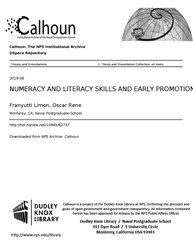File:NUMERACY AND LITERACY SKILLS AND EARLY PROMOTION (IA numeracyandliter1094562737).pdf

Original file (1,275 × 1,650 pixels, file size: 2.12 MB, MIME type: application/pdf, 58 pages)
Captions
Captions
Summary[edit]
| NUMERACY AND LITERACY SKILLS AND EARLY PROMOTION
( |
||
|---|---|---|
| Author |
Franyutti Limon, Oscar Rene |
|
| Title |
NUMERACY AND LITERACY SKILLS AND EARLY PROMOTION |
|
| Publisher |
Monterey, CA; Naval Postgraduate School |
|
| Description |
This paper will report to what extent cognitive ability plays a role in predicting future promotion. This knowledge could be useful for those who are more likely to fill a higher position during their military careers, given their cognitive ability. U.S. Navy leaders could use this information to allocate resources to these Sailors in advance in order to help them achieve a higher margin of productivity and better set of skills to help them later in their careers. By doing so, the Navy would be incentivizing Sailors with the greatest cognitive ability to stay longer in the military; in turn, the Sailors will see that they get a better payoff for staying in the military longer. This study looks specifically at promotions from E-3 to E-7 between 2001 through 2011. The results of this study suggest there is a significant positive correlation between promoting early and basic cognitive ability. In fact, in most cases, the higher the score, the more likely a Sailor will promote early across the whole Navy and at the community level. Furthermore, the relevance of being more cognitively advanced becomes more important as the military member ascends the hierarchy. Given that the Armed Forces Qualification Test’s (AFQT) formula emphasizes literacy skill more than math knowledge, I argue that the AFQT’s metric captures literacy better. Therefore, by displaying higher literacy capacity, an enlistee has a better chance of early promotion. Subjects: cognitive ability; literacy skill; enlisted promotion; human capital; standardized test |
|
| Language | English | |
| Publication date | June 2019 | |
| Current location |
IA Collections: navalpostgraduateschoollibrary; fedlink |
|
| Accession number |
numeracyandliter1094562737 |
|
| Source | ||
| Permission (Reusing this file) |
Copyright is reserved by the copyright owner. | |
Licensing[edit]
| Public domainPublic domainfalsefalse |
This work is in the public domain in the United States because it is a work prepared by an officer or employee of the United States Government as part of that person’s official duties under the terms of Title 17, Chapter 1, Section 105 of the US Code.
Note: This only applies to original works of the Federal Government and not to the work of any individual U.S. state, territory, commonwealth, county, municipality, or any other subdivision. This template also does not apply to postage stamp designs published by the United States Postal Service since 1978. (See § 313.6(C)(1) of Compendium of U.S. Copyright Office Practices). It also does not apply to certain US coins; see The US Mint Terms of Use.
|
 | |
| This file has been identified as being free of known restrictions under copyright law, including all related and neighboring rights. | ||
https://creativecommons.org/publicdomain/mark/1.0/PDMCreative Commons Public Domain Mark 1.0falsefalse
File history
Click on a date/time to view the file as it appeared at that time.
| Date/Time | Thumbnail | Dimensions | User | Comment | |
|---|---|---|---|---|---|
| current | 11:49, 23 July 2020 |  | 1,275 × 1,650, 58 pages (2.12 MB) | Fæ (talk | contribs) | FEDLINK - United States Federal Collection numeracyandliter1094562737 (User talk:Fæ/IA books#Fork8) (batch 1993-2020 #23637) |
You cannot overwrite this file.
File usage on Commons
The following page uses this file:
Metadata
This file contains additional information such as Exif metadata which may have been added by the digital camera, scanner, or software program used to create or digitize it. If the file has been modified from its original state, some details such as the timestamp may not fully reflect those of the original file. The timestamp is only as accurate as the clock in the camera, and it may be completely wrong.
| Short title | NUMERACY AND LITERACY SKILLS AND EARLY PROMOTION |
|---|---|
| Image title | |
| Author | Franyutti Limon, Oscar Rene |
| Software used | Franyutti Limon, Oscar Rene |
| Conversion program | Adobe PDF Library 15.0 |
| Encrypted | no |
| Page size | 612 x 792 pts (letter) |
| Version of PDF format | 1.4 |

